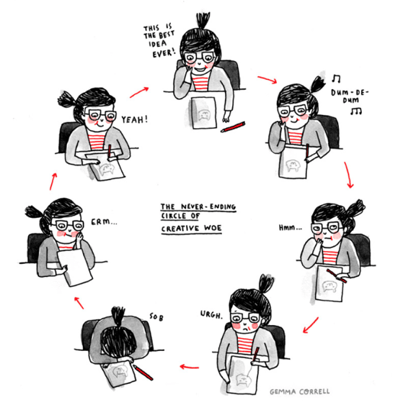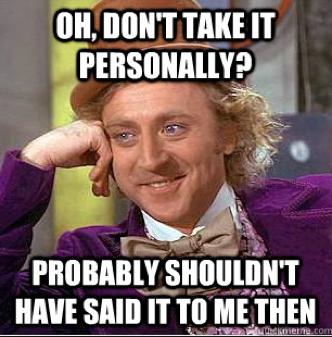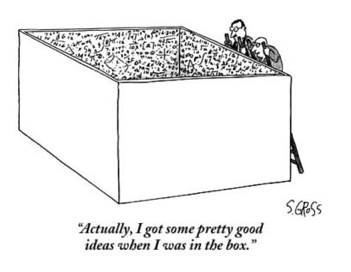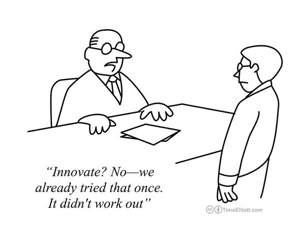 |
| Sherri Mayer Senior Vice President Creative Services |
In case you haven’t noticed, creative people are sensitive souls. (Aren’t we all?)
You’d think we’d be used to having our work critiqued. And yet, we never seem to develop a thick skin. We wear our feelings on our sleeves, pour our hearts into what we do, and go into every creative presentation with high hopes.

And when you comment on what we’ve so painstakingly labored over, we take it personally.

Sometimes, it can be frustrating to know just what to say to help your creative team deliver what you need them to deliver. I should know… I’m both a creative type and a manager of an entire department of creative types.
But here’s the thing: you don’t have to walk on eggshells. You can be honest and forthright. At the same time, there are a few phrases that can stifle a writer or designer’s ability to give you their best work. They are:
I’m not wild about it
It’s perfectly fine that you don’t care for what we presented. (Well, actually it hurts our feelings a little bit. So it might be good to start with what you DID like then get to what you didn’t.)
But as you know, we delivered what we thought was our best work. So help us understand exactly what it is that is bothering you. It’s o.k. if you don’t have the language to describe it… we can help there as well.
In order to fix what’s wrong, we need direction from you.
I want something out of the box

I’ve been a creative director for more than a decade and a copywriter for 30 years, and I still don’t know what that means.
It can’t be that we’re not supposed to consider budget, the donor, or all the many creative constraints put upon us by format and medium.
There’s always a box. And we can always be creative within it.
Here’s how I want it done
According to an article entitled “How to Kill Creativity” from the Harvard Business Review,
Creativity thrives when managers let people decide
how to climb a mountain; they needn’t, however,
let employees choose which one.
Of course, creative people need structure. We know that there are constraints. But we can’t let those dampen our passion for the job or our ability to be creative.
Telling a creative person exactly HOW to be creative actually diminishes their enthusiasm.
Back in the day when I used to teach business writing to non-writer types, the first thing I would tell my students is simply to write. Just write and keep writing. Don’t edit, don’t hold back, don’t think of all the things you can and cannot say.
Because all those limitations will prevent you from finding inspiration.
So let your creative folk find their own path to a solution. We can always edit it later.
We tried that once

Perhaps we did. But…
- Was the timing optimal?
- Was the creative excellent?
- Was it executed well?
- Has the marketplace changed?
- Has our constituency changed?
- Has the economy changed?
According to Founders and Funders, James Dyson created 5,126 prototypes of his vacuum cleaner before succeeding. Steven Spielberg was rejected by famed USC Film School three times. Even the founder of Pandora approached investors 300 times before he got funded.
There are so many factors that go into the success of a direct marketing effort that if an idea and strategy are really solid, they’re going to naturally rise to the top. So even if it’s been tried – and failed – it may be worth looking at again.
They won’t go for it
I’ve been surprised again and again what people will say “yes” to if the strategy and the execution are on target.
Sometimes, it’s even good to show something that is, perhaps, a little left of center. It proves that you and your team are not letting roadblocks stand in the way of innovation and creativity.
So what CAN you do to inspire your creative team?

- Ask us why. If your creative team is as good as they say they are, they can tell you why an execution hits the mark. And it should always come down to strategy.
- Say “thank you.” We all need props from time to time. It feels good to know that our efforts are recognized.
- Be specific but encouraging in your critique. Help us understand what isn’t working for you. Then engage us in coming up with a solution. That way, we’ll approach the revision process with energy and enthusiasm.
- The bottom line? We put a lot of love into what we do. It means that we may be a little sensitive. But that’s precisely what makes our creative work stand out… and often, outstanding.
We hope this helps! If you have questions, comments, or other things you’d like us to discuss in Straight Talk, send us a note.





